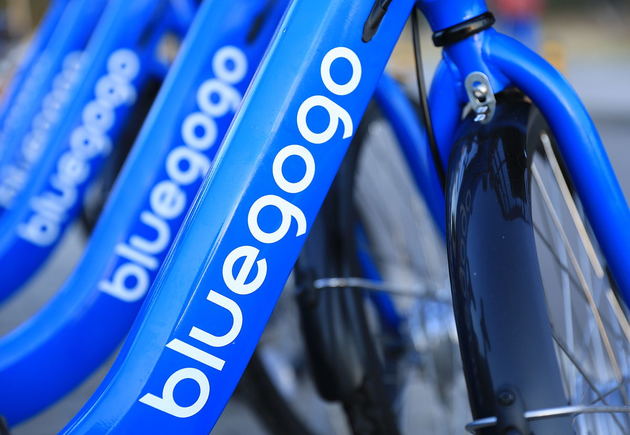
Photo/VCG
Jan.10 (NBD) -- Chinese ride-hailing giant Didi Chuxing (Didi) will include bike-sharing service into its app, the company announced Tuesday.
It will integrate bike-sharing companies into its app, including Ofo, Bluegogo. Didi says the its platform will integrate more bike-sharing brands in the future.
Bluegogo deposits can be converted to ride coupons
Didi said it had reached an agreement with the collapsed bike-sharing firm Bluegogo on "co-operation arrangements" for its business. However, Bluegogo itself will remain accountable for its brand, deposits, debts and other issues. But users will have the option to convert their Bluegogo deposits into Didi bike and car ride coupons of equivalent value.
According to the filing of Bluegogo, the company has expanded into tens of Chinese cities with over 15 million registered users. It was estimated that deposits of Bluegogo totaled 2-3 billion yuan (306.7-460.1 million U.S. dollars). The company was reported to own 200-300 million yuan (30.67-46.01 million U.S. dollars) of debts to its suppliers.
Zhao Zhanling, a researcher on intellectual property studies at the China University of Political Science and Law, said in an interview with the media that Bluegogo users are free to choose whether or not to convert their deposits into Didi bike and car ride coupons. If they don't opt for coupons, they will still have legal rights to claim refunds for their deposits and leftover money.
Didi's help didn't seem to lift Bluegogo from the financial troubles. The latter announced Tuesday that it is still looking for ways to pay the money back to users who don't want Didi ride coupons in exchange.
NBD learned that the company will conduct debt restructuring so as to minimize the losses for its suppliers.
Didi to enter China's bike-sharing battle
The Didi and Bluegogo tie-up buys time for the latter, and it also offers Didi an entry point into the bike rental market.
Didi said that it plans to launch its own bike-sharing platform to integrate more brands.
Mobike and Ofo are leaders in the bike-sharing sector, followed by HelloBike and Youon Bike. Since the fall of 2016, Didi has made several investments into Ofo and become the largest shareholder of the Ofo.
Chen Liteng, an analyst of sharing-economy at the China E-commerce Research Center, told NBD that in the short term, Didi doesn't have the ability to reshuffle the bike-sharing landscape.
Didi has a huge customer base, which is good for its bike-sharing business. But as a latecomer, it might encounter greater difficulties due to stricter regulations, Chen added.
Some industry insiders agreed that the biggest difficulty facing bike-sharing is regulation. So far, many Chinese cities have banned more bikes onto the streets, which would slow Didi's step to expand its bike-sharing services.
But according to an insider at Didi, the company chose to work with authorities to standardize the industry by offering deposit-free bike renting and a more regulated parking.
So far, Didi hasn't revealed the number of bikes and which cities those bikes will go.
It was reported by some media that Didi will first launch 6 million bikes in Beijing, Guangzhou and Shenzhen, which hadn't been confirmed by the company.
Email: tanyuhan@nbd.com.cn


 川公网安备 51019002001991号
川公网安备 51019002001991号





